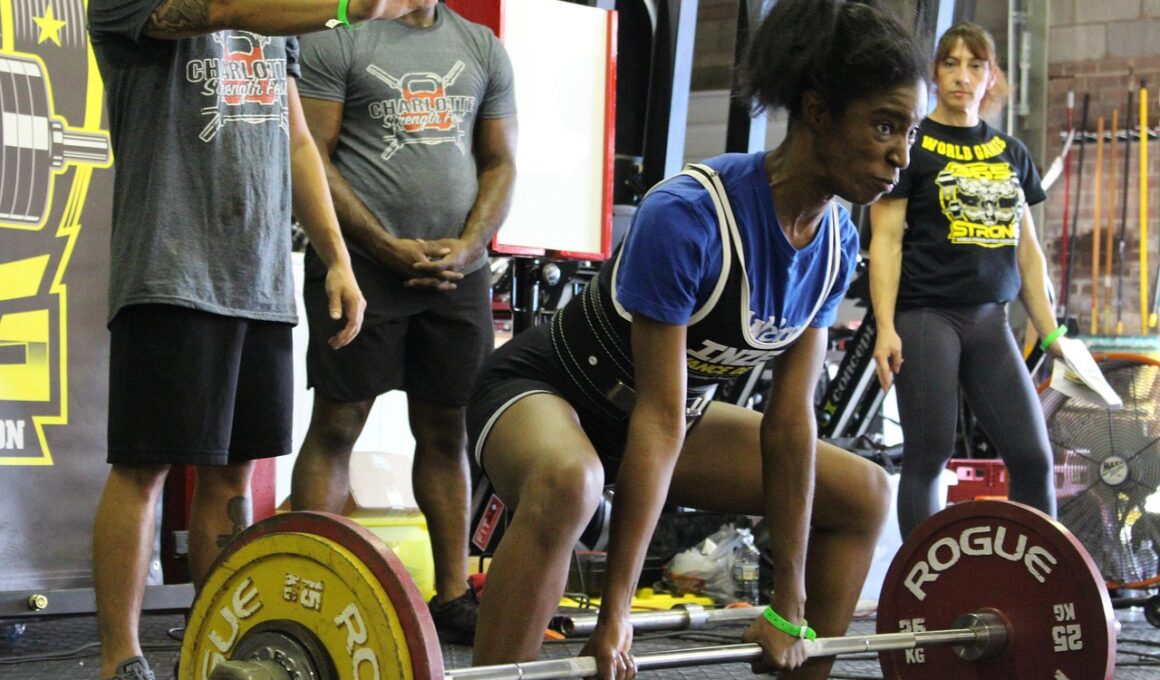Strength and Conditioning for Powerlifting Competitions
Strength and conditioning form the foundation of a successful powerlifting career. Athletes need a tailored approach that enhances strength, power, and overall physical preparedness. This includes a solid understanding of the lifts: squat, bench press, and deadlift. Each movement requires specific techniques and muscle engagement, dictating the design of effective training programs. The focus should be on building muscle fibers and improving neuromuscular efficiency, enabling lifters to maximize their performance. Periodization is essential in strength training, allowing athletes to peak precisely for competitions. Various methods such as linear or undulating periodization may suit different lifters. Additionally, progressive overload becomes critical to ensure continuous improvement. Coaches must skillfully manipulate variables, like weight, repetitions, and sets, while maintaining athlete health. Ensuring proper nutrition also plays a significant role in achieving peak performance. A well-balanced diet rich in protein, carbohydrates, and healthy fats can aid in recovery, muscle gain, and energy levels. Hydration, timing, and supplementation strategies should not be overlooked. A properly designed strength and conditioning program will ultimately help powerlifters realize their competitive potential.
The Role of Technique in Powerlifting
Mastering technique is essential for powerlifting success. Each lift is nuanced, requiring athletes to develop proficiency in their form. This precision ensures maximum lift efficiency and helps minimize injury risk. Alongside basic strength, mastering technique directly contributes to competitive performance. Coaches often emphasize technical drills to address specific deficiencies experienced by lifters. For instance, utilizing pause training can enhance stability and force generation. Moreover, video analysis allows coaches and athletes to review lifting technique critically. Continuous feedback helps instill proper habits, leading to improved performance over time. Mobility and flexibility are also critical components of technique improvement. A comprehensive warm-up routine should address joint ranges, muscle flexibility, and stability. Furthermore, athletes should practice consistent technique under varying loads to improve performance stability during competitions. Implementing drilling under submaximal loads can help athletes engage their muscles correctly. Strengthening the mind-muscle connection enhances lift execution as well. Lifters can focus on engaging specific muscle groups while maintaining proper posture throughout each lift. All these factors contribute to maximizing their overall powerlifting performance and prepare athletes for competition successes.
Building a strong mental game is just as crucial as physical preparation in powerlifting. Athletes often face immense pressure during competitions, where focus and psychological resilience can make the difference. Visualization techniques can greatly enhance mental fortitude. By imagining successful lifts and the overall competitive experience, athletes condition their minds to perform under pressure. Self-talk also plays a vital role in boosting confidence and motivation during training and competition. Positive affirmations can help athletes maintain focus, especially during challenging training sessions or competitions. Constructing a supportive environment is essential for mental preparation as well. Surrounding oneself with fellow lifters, coaches, and positive influences can bolster enthusiasm and motivation. Mental recovery techniques should not be overlooked either; they foster a healthier mindset. Activities such as meditation or mindfulness can significantly reduce anxiety and stress. Establishing pre-lift routines offers additional mental cues that help enhance focus during training sessions. Reflecting regularly on accomplishments, challenges, and progress ensures athletes remain grounded in their journey. By addressing both physical training and mental factors, powerlifters can optimize performance, achieving their fullest potential.
Nutrition Strategies for Powerlifting Athletes
Nutrition forms the backbone of athletic performance and recovery for powerlifters. Fueling the body with the right nutrients is vital to meet training demands and optimize outcomes. Athletes should prioritize a balanced diet that features a mix of macronutrients: carbohydrates, proteins, and fats. Carbohydrates serve as primary fuel sources, helping athletes maintain energy during intense training sessions. Meanwhile, adequate protein intake is critical for promoting muscle growth and aiding recovery between sessions. Recommended daily protein intake varies depending on individual goals; most athletes benefit from consuming 1.6 to 2.2 grams per kilogram of body weight. Additionally, healthy fats support hormone production and overall health, so they should not be neglected during meal planning. Timing of nutrient intake matters as well; athletes should consume a pre-training meal approximately two to three hours before workouts for optimum energy levels. Post-workout nutrition also plays a vital role in recovery; a combination of protein and carbs can help restore glycogen levels and promote muscle repair. Pre-competition meals should aim for easily digestible foods that supply sustainable energy without causing gastrointestinal distress during lifting.
Supplementation can complement a powerlifter’s diet and training regimen effectively. However, it should never serve as a substitute for whole foods. Essential supplements like creatine monohydrate can significantly enhance performance and recovery in strength training by assisting muscle energy production. Similarly, branched-chain amino acids (BCAAs) are popular for aiding muscle recovery and reducing soreness post-training, further supporting overall muscle development. It’s crucial for athletes to consult with certified nutritionists or dietitians before starting new supplementation. Additionally, monitoring hydration levels is imperative as dehydration can hinder performance. Athletes should focus on maintaining fluid balance before, during, and after training or competitions. Utilizing electrolyte-rich drinks can enhance hydration and overall recovery. Iron levels should not be overlooked either; low iron can negatively affect energy and strength. Regular blood tests can help monitor levels, ensuring that athletes maintain adequate iron stores. Overall, adopting a mindful and evidence-based approach to supplementation aligns with powerlifters’ goals for optimal performance outcomes. By focusing on nutrients, athletes can create personalized dietary protocols to elevate results and sustain peak performance across training cycles.
Recovery Techniques for Optimal Performance
Effective recovery strategies are vital for powerlifters aiming for peak performance. The intensity of training can necessitate proper recovery ventures to ensure progress without risking overuse injuries. Several techniques can contribute significantly to efficient recovery processes. Passive recovery, such as sleep, proves essential; quality sleep supports muscle repair and hormonal balance, while insufficient rest can hinder overall progress. Athletes should strive for seven to nine hours of uninterrupted sleep per night. Active recovery sessions, including light cardio or mobility work, can facilitate blood flow and promote recovery without strenuous exertion. Massage therapy aids recovery processes by addressing muscle tightness and alleviating soreness. Foam rolling can provide similar benefits independently, enhancing muscle elasticity and reducing stiffness. Contrast baths, involving alternating hot and cold water, may also help reduce soreness following intense training sessions. Nutrition plays a pivotal role in recovery, providing essential nutrients for muscle repair and growth. Post-workout meals featuring carbohydrates and proteins can significantly aid recovery. Combining these various recovery strategies will ultimately enhance powerlifting abilities, allowing athletes to extend training longevity and improve competitive performance.
Lastly, the support system surrounding a powerlifter significantly impacts overall training success and mental well-being. Establishing a trustworthy team comprising coaches, training partners, and nutritionists fosters an environment conducive to performance improvement. Coaches are responsible for developing tailored training programs, ensuring techniques are properly executed, and providing consistent feedback during workouts. Training partners can facilitate improved performance through motivation and friendly competition, making lift sessions more engaging. Apart from technical aspects, understanding when to push and when to back off during training incorporates the psychological dimensions of strength. Regular sharing of experiences, lessons, and challenges within the network enhances collective learning. Engaging in supportive online communities can also offer valuable insights and encouragement. Networking with other lifters eases knowledge sharing, and being part of such groups can provide great emotional support during challenging periods. Finally, establishing open channels of communication allows athletes to express their needs and grievances, improving overall satisfaction in the training process. By nurturing a robust support system, powerlifters can tap into their full potential, paving the way for meaningful achievements and enhanced performance.


